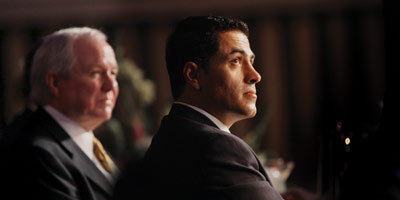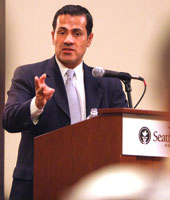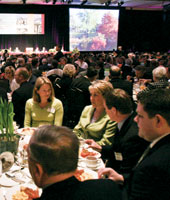 |
|
Autumn 2007 | Volume 30, Number 2
| Features
|
|
|
Project Understanding
Author of The Shia Revival Educates Americans on Islam’s Historic Divide — While Promoting Religious Dialogue

“In my opinion,” says SPU President Philip Eaton (left), “one of the most significant challenges for the Christian church in the 21st century is the way we handle our encounter with Islam. That is why it is so important to hear voices such as Vali Nasr’s on our campus. We have much to learn, and we have much to offer.”
How do Sunni Muslims differ from Shia Muslims? It’s a question most Americans can’t begin to answer. Yet, according to scholar and best-selling author Vali Nasr, understanding Islam — and, in particular, the differences between its two major sects — is critical to comprehending the world of the 21st century.
“Muslims live in every part of the world,” Nasr told guests at Seattle Pacific University’s Downtown Business Breakfast in April 2007. “Islam is in Africa, Southeast Asia, Europe, North Africa, the Middle East, and Central Asia. And Islam is one of the fastest-
growing religions in America. Non-Muslim Americans will increasingly engage Muslims in the economic sphere, the social sphere, and the political sphere.”
Nasr is author of a best-seller titled The Shia Revival: How Conflicts Within Islam Will Shape the Future (W.W. Norton, 2006). He serves as adjunct senior fellow for Middle Eastern studies at the Council on Foreign Relations, and as a professor at the Fletcher School of Law and Diplomacy of Tufts University. His credentials as a leading scholar of Islam have made him a highly sought-after advisor — from President George W. Bush to Congress.
Seattle Pacific President Philip Eaton invited Nasr to headline the Business Breakfast because of the University’s signature commitment to knowing and understanding what is going on in the world. “If we want to help make this world a better place, then we need knowledge, and we need wisdom, about Islamic history and the Muslim faith,” says Eaton. “I see Vali Nasr as someone who can speak about this in fresh and unbiased ways. I also believe, as Christians, with more than one billion Muslims in the world, we need to better understand our encounter with the Muslim world.”

Vali Nasr, author of The Shia Revival: How Conflicts Within Islam Will Shape the Future, spoke at Seattle Pacific University’s Downtown Business Breakfast in 2007. |
Nasr’s passion is educating Americans about the Muslim world and the complexities of the conflicts raging in the Middle East — and that passion is deeply personal. A Muslim American who grew up in Iran, his family left their homeland as exiles during the Iranian Revolution. The experience motivated a young Nasr to spend nearly 20 years studying Islam’s history, Middle East politics, and Islam’s relations with the West.
“How can we be involved in developing policy toward societies when we don’t understand their divisions and complexities?” asks Nasr.
Making sense of current events in the Middle East, Nasr tells audiences, requires an objective understanding of the age-old conflict at the heart of the Muslim world between the Sunnis and the Shia. The differences between these strands are stark, and as historically influential as the differences between Catholics and Protestants in Northern Ireland.
The origins of the Sunni-Shia divide go back to a disagreement over how to select a successor to Muhammad, founder of Islam, when he died in A.D. 632. Those who became known as Sunnis favored Abu Bakr, the choice of a council of elders. Those who became known as Shia favored Muhammad’s cousin and son-in-law Ali. Ali was subsequently assassinated, and increasing friction led to the emergence of the Shia, who argued that God had gifted only Muhammad’s blood descendants with leadership.
The Shia regard the murdered Ali as a kind of saint and still call for his help today. They believe, unlike the Sunnis, that the true leaders of Muslims inherit Muhammad’s “special relationship with God,” rather than serving solely as human agents.
As the chasm between the two groups widened, they developed differing views, traditions, and lifestyles. But both view themselves as the true orthodox Muslims. In The Shia Revival, Nasr writes that the two branches of Islam “not only understand Islamic history, theology, and law differently, but each breathes a distinct ethos of faith and piety that nurtures a particular temperament and a unique approach to the question of what it means to be Muslim.”

Nearly 1,000 people gathered to hear Vali Nasr at SPU’s annual Downtown Business Breakfast at the Seattle Sheraton. |
At SPU and elsewhere, Nasr tries to help Americans comprehend why the United States and its allies have found it so difficult to cultivate relationships and encourage the establishment of a democracy in Iraq. The steady violence in Iraq is not primarily violence against Americans, he explains. Rather, the West’s attempt to bring democracy to a country formerly ruled by a totalitarian regime has reawakened the ancient conflict within Islam. In toppling Saddam Hussein, the United States gave a suppressed Islamic sect — the Shia — a chance to gain power and upset the dominant Middle Eastern majority — the Sunnis, some of whom supported Saddam. Western forces are caught in the crossfire.
An American contribution to the resolution of this conflict will be extremely difficult to identify, says Nasr, and will require a deeper understanding of Islam: “How can we be involved in developing policy toward societies when we don’t understand their divisions and complexities?”
This is important for the same reasons a Muslim needs to know about the divides within Christianity, he argues. “If a Muslim is going to engage in a dialogue with Christians, he or she needs to know the difference between Catholic and Protestant theology,” he says. “If Muslims are going to Ireland, they really ought to know this difference. If they’re in Eastern Europe, there’s a big difference between the Orthodox and the Catholic church. If you are going to try to relate to another culture’s or religion’s values, you need to know what it is that the people believe in.”
While Muslims can find some common ground for dialogue with Christians — regarding morality, and the existence of God, heaven, and hell, for instance — they have more difficulty comprehending secularists. Nasr explains, “That’s why when you listen to the language of hard-line Muslim fundamentalists, there is never a denunciation of Christianity. There’s always a denunciation of the secular West. Sometimes what grieves them is not that different from what grieves or motivates Christians in the political arena in the U.S.”
A university such as Seattle Pacific, Nasr says, can play an important part in equipping students to create dialogue between the West and Islam. “There is no doubt that the Muslim world matters greatly to America’s interests globally, to its power, and to its well-being,” he continues. “An educated student will have plenty of opportunity — at an individual level, or through his or her company, organization, or if they work for the government — to bring empathy and understanding, and to help the process of managing America’s relations with the Muslim world.”
—By Jeffrey Overstreet [jeffreyo@spu.edu]
—Photos by Mike Siegel
Back to the top
Back to Features Home
|
| |
|
 |
|
 |